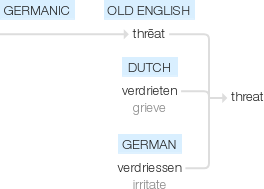Threat
Old English thrēat ‘oppression’, of Germanic origin; related to Dutch verdrieten ‘grieve’, German verdriessen ‘irritate’.
wiktionary
From Middle English threte, thret, thrat, thræt, threat, from Old English þrēat(“crowd, swarm, troop, army, press; pressure, trouble, calamity, oppression, force, violence, threat”), from Proto-Germanic *þrautaz, closely tied to Proto-Germanic *þrautą(“displeasure, complaint, grievance, labour, toil”), from Proto-Indo-European *trewd-(“to squeeze, push, press”), whence also Middle Low German drōt(“threat, menace, danger”), Middle High German drōz(“annoyance, disgust, horror, terror, fright”), Icelandic þraut(“struggle, labour, distress”), Latin trūdō(“push”, verb).
From Middle English threten, from Old English þrēatian(“to press, oppress, repress, correct, threaten”). Akin to Middle Dutch drōten(“to threaten”).
etymonline
threat (n.)
Old English þreat "crowd, troop," also "oppression, coercion, menace," related to þreotan "to trouble, weary," from Proto-Germanic *thrautam (source also of Dutch verdrieten, German verdrießen "to vex"), from PIE *treud- "to push, press squeeze" (source also of Latin trudere "to press, thrust," Old Church Slavonic trudu "oppression," Middle Irish trott "quarrel, conflict," Middle Welsh cythrud "torture, torment, afflict"). Sense of "conditional declaration of hostile intention" was in Old English.
